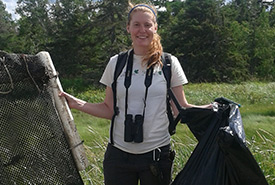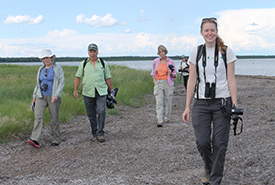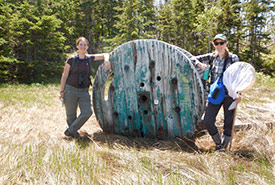Where are they now? Intern Alumni Spotlight: Claire Elliott

Claire Elliott at a Conservation Volunteers event in Tabusintac, NB (Photo by Joanna Hudgins)
This blog marks the eighth Intern Alumni Spotlight — a series highlighting some of the individuals who have interned with the Nature Conservancy of Canada (NCC) in the past. Last month, Victoria Shore was featured as the Intern Alumni Spotlight, and this month we are following up with Claire Elliott.
Where she started: Claire graduated from the geomatics undergraduate co-op program at the University of Waterloo. After she finished her undergraduate degree, she completed a master’s in physical geography at Carleton University. Within these two programs, she completed courses in life sciences, physical sciences, computer science, geographic information systems (GIS) and remote sensing.
Before she started as an intern with NCC, Claire had a few co-op jobs that involved doing GIS in non-environmental, non-conservation capacities. "Though the GIS work [I was doing] was similar to the work I do now, I didn’t find the application all that interesting," she says. "My passion lies in the application of GIS to conservation and environmental sciences."
Related blog posts
As an intern: Claire worked as a conservation intern for NCC’s Atlantic Region from May to August 2015. She was based out of the Fredericton office, but also spent a couple of weeks in PEI.

Claire Elliott at a Conservation Volunteers event (Photo by NCC)
She spent most of her time doing stewardship work on NCC properties in New Brunswick and PEI. This work included invasive species removal, litter cleanup, trail maintenance and mapping property features. The rest of her time was spent in the office preparing to do field work, writing reports and creating maps.
"My internship confirmed to me that I wanted to work in conservation," she says. "I had worked other jobs during my undergraduate degree, but I think actually landing an intern position in conservation helped show me which path I wanted to take my career down."
Where she is now: Claire has been working as the GIS coordinator for NCC’s Ontario Region for about three years. In this role, she manages Ontario Region’s spatial data (i.e., information tied to locations in space, represented by coordinates). More specifically, she processes, stores, manipulates and analyzes spatial data representing species observations, anthropogenic (human-made) features, habitats and others. This spatial data comes from field biologists who have collected it on NCC properties, typically using GPS, as well as from external sources, such as the Ontario Ministry of Natural Resources and Forestry, NCC partners and the federal government. Claire also does mapping and GIS analyses for internal reporting, such as for Property Management Plans, baseline inventories and Natural Area Conservation Plans, as well as for external publications, such as brochures and public trail maps.

Joanna Hudgins and Claire Elliott (Photo by NCC)
Where she is going: Claire hopes that 10 years from now she’ll still be working in conservation. "I just really love working in a sector that I’m passionate about, and I would love to still be working for NCC 10 years from now," she says. "I would love to expand my knowledge and become a more well-rounded conservation professional in the next 10 years."
Her advice for interns: "Try out a few different types of jobs in the conservation field, if you can. Even if you find yourself following a certain career path and know you want to end up working in GIS or as a field biologist, it really helps to have a wide background of knowledge. There are a lot of hidden jobs in conservation that people often don’t think about. If you can get experience in as many of these jobs as possible, you’ll be able to find your niche and what really excites you. You’ll also set yourself up to bring more to the table. I think you should definitely think beyond whatever kind of box you may have put yourself in."
Are you interested in building a career in conservation? Check out NCC's Conservation Internship Program for more information on current opportunities!
The Conservation Internship Program is funded in part by the Government of Canada's Summer Work Experience program.


